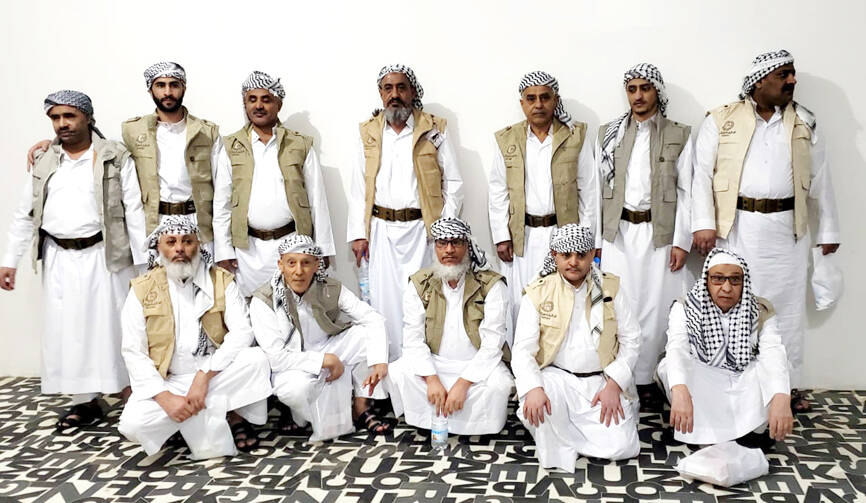Saudi Arabia on Saturday released more than a dozen war prisoners to their rivals, the Houthi rebels in Yemen, a Houthi official said.
The release came as Omani officials arrived in the Yemeni capital as part of international efforts to end Yemen’s years-long conflict.
Abdul-Qader el-Murtaza, a Houthi official in charge of prisoner exchange talks in Yemen’s conflict, said 13 Houthi prisoners on Saturday arrived in the capital, Sanaa.

Photo: EPA-EFE
He said the prisoners were released in exchange for a Saudi prisoner the Houthis freed, but did not indicate when the rebels released the Saudi prisoner.
Saturday’s release was part of a UN-brokered deal which Yemen’s warring parties struck last month and includes the release of nearly 900 prisoners from both sides, el-Murtaza said.
The UN-brokered deal is scheduled to be implemented this month.
Yemen’s conflict began in 2014, when the Houthis seized Sana’a and much of the country’s north, ousting the internationally recognized government that fled to the south then into exile in Saudi Arabia.
The Houthi move prompted a Saudi-led coalition to intervene months later in a bid to restore the internationally recognized government to power.
The conflict in the past few years has turned into a regional proxy war between Saudi Arabia and Iran. It has killed more than 150,000 people, including fighters and civilians, and created one of the world’s worst humanitarian disasters.
Omani officials, meanwhile, landed in Sana’a for talks with Houthi officials in the latest efforts to renew a ceasefire deal that expired in October last year, Houthi chief negotiator Mohammed Abdul-Salam said.
Oman has for years hosted talks between the Iranian-backed Houthis and Saudi Arabia. The talks have been intensified since the warring sides failed to renew a UN-brokered ceasefire in October.
The Houthi-run al-Masirah television network reported that a Saudi delegation, led by the Saudi ambassador to Yemen, Mohammed bin Saeed Al-Jaber, would visit Sana’a yesterday, also for talks with the Houthis.
The negotiations in Oman’s capital, Muscat, focused on preventing all-out fighting after the ceasefire collapsed, and laying out a path for a negotiated end to Yemen’s civil war.
These talks have gained momentum in recent weeks after Saudi Arabia reached an agreement with Iran to restore their diplomatic ties after a seven-year rift. The Iran-Saudi deal, announced in Beijing on March 10, has invigorated hopes of a settlement to Yemen’s conflict.

‘UNUSUAL EVENT’: The Australian defense minister said that the Chinese navy task group was entitled to be where it was, but Australia would be watching it closely The Australian and New Zealand militaries were monitoring three Chinese warships moving unusually far south along Australia’s east coast on an unknown mission, officials said yesterday. The Australian government a week ago said that the warships had traveled through Southeast Asia and the Coral Sea, and were approaching northeast Australia. Australian Minister for Defence Richard Marles yesterday said that the Chinese ships — the Hengyang naval frigate, the Zunyi cruiser and the Weishanhu replenishment vessel — were “off the east coast of Australia.” Defense officials did not respond to a request for comment on a Financial Times report that the task group from

Asian perspectives of the US have shifted from a country once perceived as a force of “moral legitimacy” to something akin to “a landlord seeking rent,” Singaporean Minister for Defence Ng Eng Hen (黃永宏) said on the sidelines of an international security meeting. Ng said in a round-table discussion at the Munich Security Conference in Germany that assumptions undertaken in the years after the end of World War II have fundamentally changed. One example is that from the time of former US president John F. Kennedy’s inaugural address more than 60 years ago, the image of the US was of a country

BLIND COST CUTTING: A DOGE push to lay off 2,000 energy department workers resulted in hundreds of staff at a nuclear security agency being fired — then ‘unfired’ US President Donald Trump’s administration has halted the firings of hundreds of federal employees who were tasked with working on the nation’s nuclear weapons programs, in an about-face that has left workers confused and experts cautioning that the Department of Government Efficiency’s (DOGE’s) blind cost cutting would put communities at risk. Three US officials who spoke to The Associated Press said up to 350 employees at the National Nuclear Security Administration (NNSA) were abruptly laid off late on Thursday, with some losing access to e-mail before they’d learned they were fired, only to try to enter their offices on Friday morning

CONFIDENT ON DEAL: ‘Ukraine wants a seat at the table, but wouldn’t the people of Ukraine have a say? It’s been a long time since an election, the US president said US President Donald Trump on Tuesday criticized Ukrainian President Volodymyr Zelenskiy and added that he was more confident of a deal to end the war after US-Russia talks. Trump increased pressure on Zelenskiy to hold elections and chided him for complaining about being frozen out of talks in Saudi Arabia. The US president also suggested that he could meet Russian President Vladimir Putin before the end of the month as Washington overhauls its stance toward Russia. “I’m very disappointed, I hear that they’re upset about not having a seat,” Trump told reporters at his Mar-a-Lago resort in Florida when asked about the Ukrainian